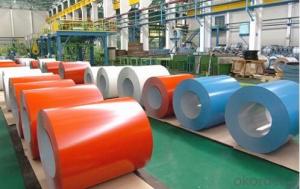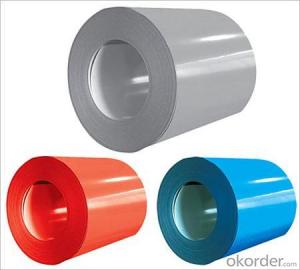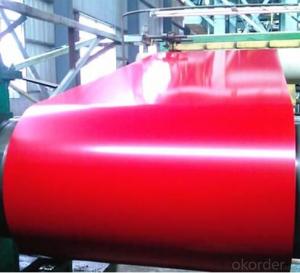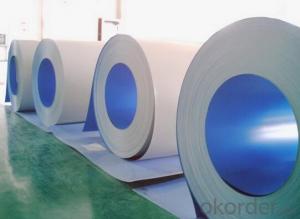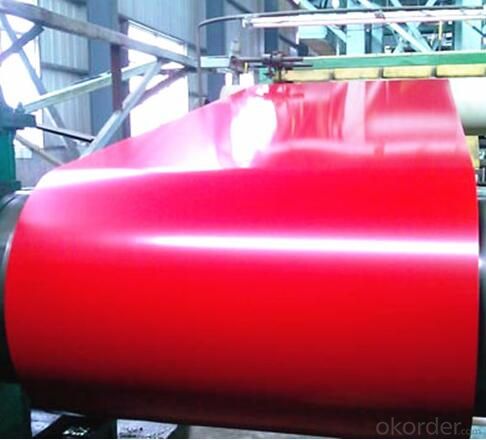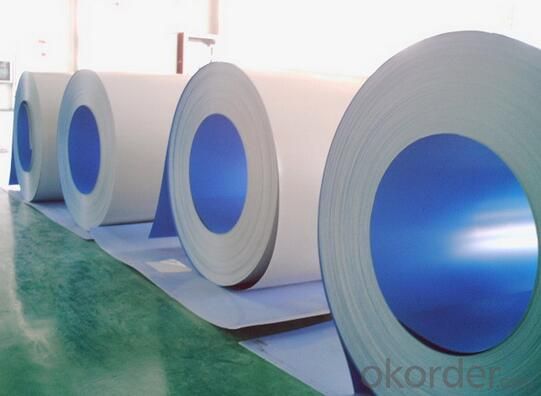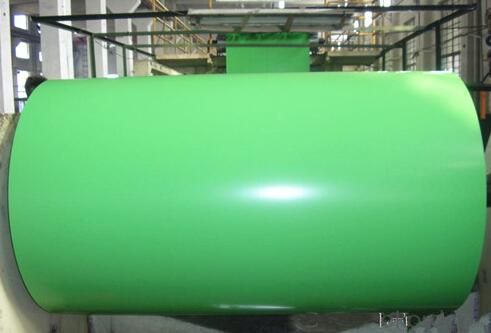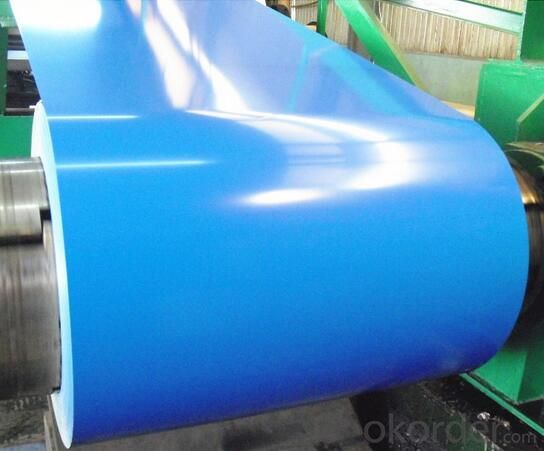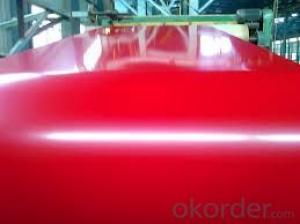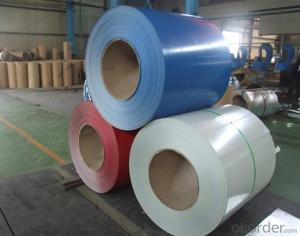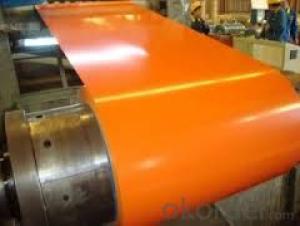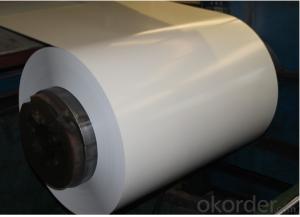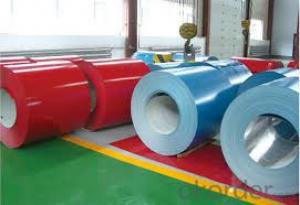PPGI Prepainted Galvanized Steel Coil-Color Coated Aluminium Coil-Roofing Sheet
- Loading Port:
- Tianjin
- Payment Terms:
- TT or LC
- Min Order Qty:
- 30 m.t.
- Supply Capability:
- 10000 m.t./month
OKorder Service Pledge
OKorder Financial Service
You Might Also Like
Specification
PPGI Prepainted Galvanized Steel Coil-Color Coated Aluminium Coil-Roofing Sheet
Details of PPGI Prepainted Galvanized Steel Coil-Color Coated Aluminium Coil-Roofing Sheet
Grade | DX51D, SGCC, CGCC |
Thickness | 0.15mm-1.5mm |
Width | 600mm-1500mm(914/1219/1250 are available) |
Standard | JIS G3312, ASTM,GB/T1275 |
Certificate | ISO9001.ISO14001.OHSAS18001 |
Length | As per requests |
Zinc Coating | 40g-275g/m2 |
Lacquer Coated | 20-25 microns/5-15 microns |
Coil ID | 508mm/610mm |
Coil Weight | normally 3-10mt or as your requirement |
Supply ability | 200,000Mt/year (MOQ:25Mt) |
Color | RAL No. |
Price terms | FOB,CFR,CIF |
Payment terms | L/C,T/T |
Deliver time | 30days after received deposit or L/C |
Packing | Standard exporting package |
steel strip Water proof paper, metal covers, | |
Application | Corrugated roofing,outside building, |
boating building,car producing | |
household appliance | |
Main market | Southeast Asia , the EU, Russia, Ukraine , Latin America and other countries and Regions |
Specification of PPGI Prepainted Galvanized Steel Coil-Color Coated Aluminium Coil-Roofing Sheet
Thickness | Width | Length of plate | Inner diameter of coil |
0.18-1.2mm | 800/914/1000/1200/1219/1250mm | 1000-6000mm | 508mm/610mm |
Coated Mass: | |||
Available Coated Mass(g/m^2) | Base plate | Available Coated Mass(g/m^2) | |
60,80, 100, 120, 160, 180 | Galvanized Steel | 60,80, 100, 120, 160, 180 | |
50, 70, 150 | Galvalume Steel | 50, 70, 150 |
Painting | Item | Code | |
Polyester | PE | ||
High-durability polyester | HDP | ||
Silicon modified polyesters | SMP | ||
Polyvinylidene fluoride | PVDF | ||
Easy-Cleaning | — | ||
Painting Thickness | Top side: 20±5microns; | ||
Bottom side: 5~7microns. | |||
Color System | Produce according to RAL Color System or as per buyer’s color sample. | ||
Painting structure | Top surface | Bottom surface |
|
Primer coating | No coating | 1/0 | |
Primer coating | Primer coating | 1/1 | |
Primer coating + Finish coating | No coating | 2/0 | |
Primer coating + Finish coating | Primer coating or single back coating | 2/1 | |
Primer coating + Finish coatin | Primer coating + Finish back coating | 2/2 | |
CNBM Introduction of PPGI Prepainted Galvanized Steel Coil-Color Coated Aluminium Coil-Roofing Sheet
CNBM International Corporation is the most import and export platform of CNBM group(China National Building Material Group Corporation) ,which is a state-owned enterprise, ranked in 270th of Fortune Global 500 in 2015.
With its advantages, CNBM International are mainly concentrate on Cement, Glass, Iron and Steel, Ceramics industries and devotes herself for supplying high quality series of refractories as well as technical consultancies and logistics solution.
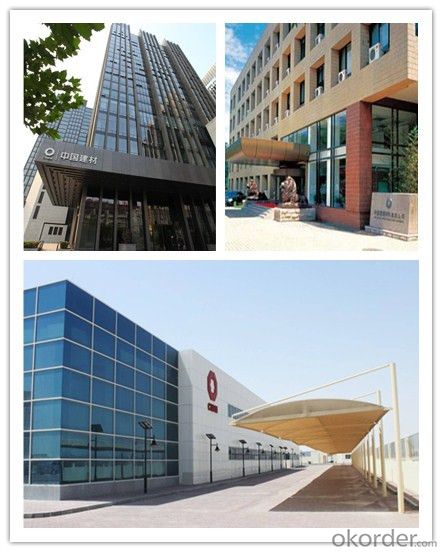
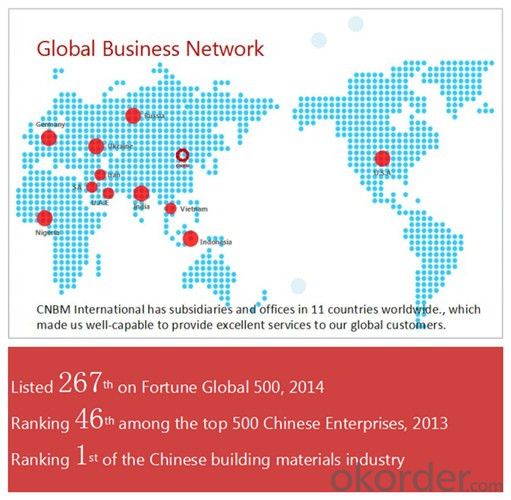
Packaging & Delivery of PPGI Prepainted Galvanized Steel Coil-Color Coated Aluminium Coil-Roofing Sheet
Packaging Detail | Sea worthy packing /as per customer's packing instruction |
Delivery Detail | 15 ~ 40 days after receiving the deposit |
Products Show
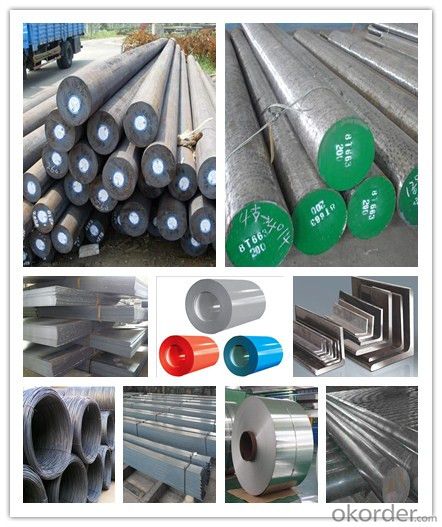
FAQ:
Are you a trading company or manufacturer? | Manufacturer |
What’s the MOQ? | 3 metric ton |
What’s your delivery time? | 15-35 days after downpayment received |
Do you Accept OEM service? | Yes |
what’s your delivery terms? | FOB/CFR/CIF |
What's the Payment Terms? | 30% as deposit,70% before shipment by T/T |
Western Union acceptable for small amount. | |
L/C acceptable for large amount. | |
Scrow ,Paybal,Alipay are also ok | |
Why choose us? | Chose happens because of quality, then price, We can give you both. Additionally, we can also offer professional products inquiry, products knowledge train (for agents), smooth goods delivery, excellent customer solution proposals. |
What's your available port of Shipment? | Main Port, China |
What’s your featured services? | Our service formula: good quality+ good price+ good service=customer's trust
|
Where are your Market? | Covering more than 160 countries in the world |
- Q: How does special steel perform in high-temperature mechanical applications?
- Special steel is specifically designed to perform exceptionally well in high-temperature mechanical applications. Unlike regular steel, special steel contains alloying elements such as chromium, nickel, and molybdenum, which enhance its heat resistance and mechanical properties. At high temperatures, special steel exhibits excellent strength and toughness, ensuring it can withstand the harsh conditions encountered in high-temperature environments. It retains its structural integrity even when exposed to extreme heat, making it suitable for applications such as furnaces, boilers, and gas turbines. Special steel also maintains its dimensional stability at elevated temperatures, which means it does not deform or warp easily. This property is crucial in high-temperature mechanical applications where precise dimensions and tight tolerances are required for optimal performance. Furthermore, special steel exhibits excellent corrosion resistance, even at high temperatures. This resistance is crucial in preventing the formation of oxide scales and reducing the risk of premature failure due to corrosion. In summary, special steel performs exceptionally well in high-temperature mechanical applications due to its enhanced heat resistance, strength, toughness, dimensional stability, and corrosion resistance. It provides reliability and durability in extreme heat conditions, making it a preferred choice for various industries where high-temperature environments are encountered.
- Q: What are the different types of case-hardening steel?
- There are several different types of case-hardening steels, including carburizing steel, nitriding steel, and cyaniding steel. These steels are specifically designed to undergo a surface-hardening process, where the outer layer of the steel is made harder while maintaining a tough core. Carburizing steel is treated with carbon-rich materials to increase its carbon content, while nitriding steel is exposed to nitrogen to form a hard surface layer. Cyaniding steel is treated with cyanide salts to produce a hard and wear-resistant surface. Each type of case-hardening steel has its own specific properties and applications.
- Q: What are the requirements for special steel used in pharmaceutical manufacturing?
- The pharmaceutical manufacturing industry demands stringent requirements for special steel. To guarantee the safety, purity, and effectiveness of the products, the steel must adhere to specific specifications and meet various criteria. Foremost, the steel used in pharmaceutical manufacturing must be of top-notch quality and possess exceptional corrosion resistance. This is vital to prevent any contamination or reaction with the pharmaceutical compounds or chemicals involved. It is imperative that the steel does not release any impurities that could compromise the purity of the final product. Additionally, the steel must be capable of withstanding high temperatures and pressures, as pharmaceutical manufacturing processes often involve heat treatment, sterilization, and other high-temperature operations. It is crucial that the steel maintains its structural integrity and does not affect the quality of the pharmaceutical products under these conditions. Another significant requirement for the steel used in pharmaceutical manufacturing is easy cleanability. The steel should have a smooth surface without any cracks, crevices, or rough areas that could trap bacteria, contaminants, or residues. This is essential to maintain the hygiene and sterility of the manufacturing environment and ensure that the pharmaceutical products meet the highest quality standards. Furthermore, the steel must comply with regulatory standards and industry guidelines. It should meet the specific requirements set by regulatory bodies such as the Food and Drug Administration (FDA) or the European Medicines Agency (EMA). These standards often include specifications regarding the composition, mechanical properties, and traceability of the steel. In conclusion, the requirements for special steel used in pharmaceutical manufacturing are strict and encompass factors such as top-notch quality, corrosion resistance, heat resistance, cleanability, and compliance with regulatory standards. Meeting these requirements is vital to guarantee the safety, purity, and effectiveness of the pharmaceutical products manufactured using this steel.
- Q: What are the properties of magnetic stainless steel?
- Magnetic stainless steel is a type of stainless steel that exhibits magnetic properties due to its high iron content. It possesses good corrosion resistance, durability, and high strength, making it suitable for various applications. Additionally, it is easily formable and weldable, allowing for versatility in manufacturing processes.
- Q: How does special steel contribute to the food processing industry?
- Special steel contributes to the food processing industry by providing high-quality and durable materials for the production of equipment and machinery. The unique properties of special steel, such as corrosion resistance, heat resistance, and hygiene, ensure that the food processing industry can maintain strict standards of cleanliness and efficiency. This type of steel is used in various applications, including cutting, grinding, and packaging, ultimately enhancing the safety, productivity, and longevity of food processing operations.
- Q: How is leaded steel used in machining operations?
- Leaded steel is commonly used in machining operations due to its improved machinability. The addition of lead to the steel composition enhances its ability to be cut, drilled, and shaped with ease, reducing tool wear and improving surface finish. This type of steel is particularly useful in high-speed machining applications, where efficiency and precision are crucial.
- Q: What are the different annealing techniques used for special steel?
- There are several annealing techniques used for special steel, including full annealing, spheroidizing annealing, and stress relieving annealing. Full annealing involves heating the steel to a high temperature and then slowly cooling it, which helps to refine the grain structure and reduce internal stresses. Spheroidizing annealing is used to soften the steel and improve machinability by forming spherical carbides within the microstructure. Stress relieving annealing is performed to reduce residual stresses in the steel, typically after significant machining or welding operations. These different techniques allow for the customization of special steel properties to meet specific application requirements.
- Q: What are the requirements for special steel used in high-temperature applications?
- To ensure optimal performance and durability in extreme conditions, special steel utilized in high-temperature applications, such as aerospace, power generation, and oil and gas industries, must fulfill specific criteria. Some essential requirements for this type of steel include: 1. Excellent strength and resistance to deformation at elevated temperatures are vital for maintaining structural integrity and preventing failure or deformation under extreme heat. 2. High resistance to oxidation is necessary to prevent the formation of oxides on the steel's surface, which can weaken its structure and compromise its performance. 3. Exceptional creep resistance is essential to prevent excessive deformation or failure over time caused by constant stress at high temperatures. 4. Good thermal stability allows the steel to retain its mechanical properties even after prolonged exposure to high temperatures, ensuring reliable and consistent performance. 5. In addition to oxidation, the steel must also possess good corrosion resistance to protect against various corrosive agents present in the environment, such as acids, alkalis, and salts. 6. High resistance to thermal fatigue is crucial to prevent cracking, fracturing, or failure due to repeated heating and cooling cycles. 7. Low thermal expansion minimizes dimensional changes and maintains dimensional stability under high-temperature conditions, preventing unwanted distortions or misalignments. 8. Good weldability facilitates the fabrication and joining of components, enabling the construction of complex structures and assemblies required in high-temperature environments. By meeting these requirements, special steel used in high-temperature applications can withstand extreme heat, preserve its structural integrity, and deliver reliable performance in demanding conditions.
- Q: How does special steel contribute to the efficiency of industrial equipment?
- Special steel contributes to the efficiency of industrial equipment by offering superior strength, durability, and resistance to wear and tear. Its unique properties enable the production of lighter and more compact equipment, resulting in reduced energy consumption, increased productivity, and improved overall performance. Additionally, special steel's high corrosion resistance helps to prolong the lifespan of industrial equipment, reducing maintenance costs and enhancing operational efficiency.
- Q: What is the difference between stainless steel and special steel?
- Stainless steel is a type of steel that contains a minimum of 10.5% chromium content, which helps it resist corrosion and staining. On the other hand, special steel refers to a wide range of steel alloys that are specifically designed and manufactured for specific applications or purposes, such as high-strength, heat-resistant, or wear-resistant properties. So, while stainless steel is a specific type of steel with corrosion-resistant properties, special steel encompasses various alloys tailored for specific needs.
Send your message to us
PPGI Prepainted Galvanized Steel Coil-Color Coated Aluminium Coil-Roofing Sheet
- Loading Port:
- Tianjin
- Payment Terms:
- TT or LC
- Min Order Qty:
- 30 m.t.
- Supply Capability:
- 10000 m.t./month
OKorder Service Pledge
OKorder Financial Service
Similar products
Hot products
Hot Searches
Related keywords
